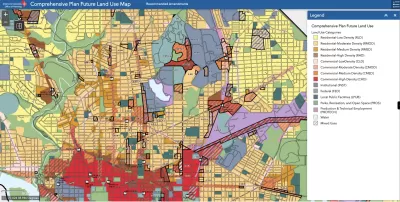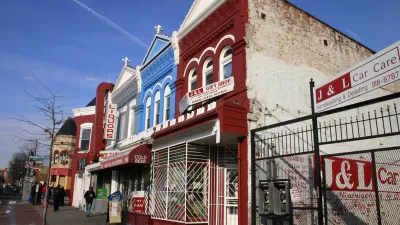The new D.C. Office of Equity has produced an evaluation of proposed changes to the D.C. Comprehensive Plan.

[Updated April 22, 2021]
"As the D.C. Council prepares to debate and propose amendments to the city’s Comprehensive Plan, a new analysis from the Council’s Office of Racial Equity has issued a withering assessment of the plan’s impact on racial equity," reports Ally Schweitzer.
Schwietzer puts the report in context of the political and planning process for the Comprehensive Plan update:
The analysis is expected to be the subject of intense discussion [April 20], as lawmakers convene to work on proposed changes to the roughly 1,500-page land-use document, which guides development and growth in the city over a 20-year period. The markup is the latest phase in a five-year-long amendment process watched closely by low-income housing advocates, real estate developers and supporters of “smart growth” policies.
The controversial issues in question include how much to incentivize new housing development as an affordable housing tool and whether the plan does enough to prevent gentrification and displacement. Mayor Muriel Bowser wants the update to make it remove some exclusionary zoning restrictions. Recent amendments proposed by Council Chairman Phil Mendelson "added numerous references to racial segregation, racial equity and prioritizing housing affordability," according to Schweitzer.
“The Comprehensive Plan, as introduced, fails to address racism, an ongoing public health crisis in the District,” the report says. “It appears that racial equity was neither a guiding principle in the preparation of the Comprehensive Plan, nor was it an explicit goal for the Plan’s policies, actions, implementation guidance, or evaluation. These process failures laid the groundwork for deficiencies in policy: proposals are ahistorical, solutions are not proportionate to racial inequities, and directives are concerningly weak or vague.”
The Office of Racial Equity was established in January 2021, with the purpose of independently assessing legislation for consequences relevant to racial equity. D.C. Mayor Muriel Bowser appointed Amber Hewitt to lead this office as Chief Equity Office earlier in April.
[Update: Michael Brice-Saddler and Julie Zauzmer report the latest development in the approval process for the proposed amendments to the D.C. Comprehensive Plan: "The D.C. Council on Tuesday advanced amendments to the massive blueprint that will shape city development in coming years, though several lawmakers voiced concerns that the changes do not adequately address systemic racial and socioeconomic inequities." Also, "Tuesday’s vote was the first step in a legislative process that will unfold over the next several weeks to amend the Comprehensive Plan, which is rewritten every 20 years and spells out the District government’s rules for land use in every neighborhood of the city."]
FULL STORY: Bowser’s Changes To D.C.’s Comprehensive Plan Will ‘Exacerbate Racial Inequities,’ Analysis Says

Planetizen Federal Action Tracker
A weekly monitor of how Trump’s orders and actions are impacting planners and planning in America.

Map: Where Senate Republicans Want to Sell Your Public Lands
For public land advocates, the Senate Republicans’ proposal to sell millions of acres of public land in the West is “the biggest fight of their careers.”

Restaurant Patios Were a Pandemic Win — Why Were They so Hard to Keep?
Social distancing requirements and changes in travel patterns prompted cities to pilot new uses for street and sidewalk space. Then it got complicated.

Platform Pilsner: Vancouver Transit Agency Releases... a Beer?
TransLink will receive a portion of every sale of the four-pack.

Toronto Weighs Cheaper Transit, Parking Hikes for Major Events
Special event rates would take effect during large festivals, sports games and concerts to ‘discourage driving, manage congestion and free up space for transit.”

Berlin to Consider Car-Free Zone Larger Than Manhattan
The area bound by the 22-mile Ringbahn would still allow 12 uses of a private automobile per year per person, and several other exemptions.
Urban Design for Planners 1: Software Tools
This six-course series explores essential urban design concepts using open source software and equips planners with the tools they need to participate fully in the urban design process.
Planning for Universal Design
Learn the tools for implementing Universal Design in planning regulations.
Heyer Gruel & Associates PA
JM Goldson LLC
Custer County Colorado
City of Camden Redevelopment Agency
City of Astoria
Transportation Research & Education Center (TREC) at Portland State University
Camden Redevelopment Agency
City of Claremont
Municipality of Princeton (NJ)





























